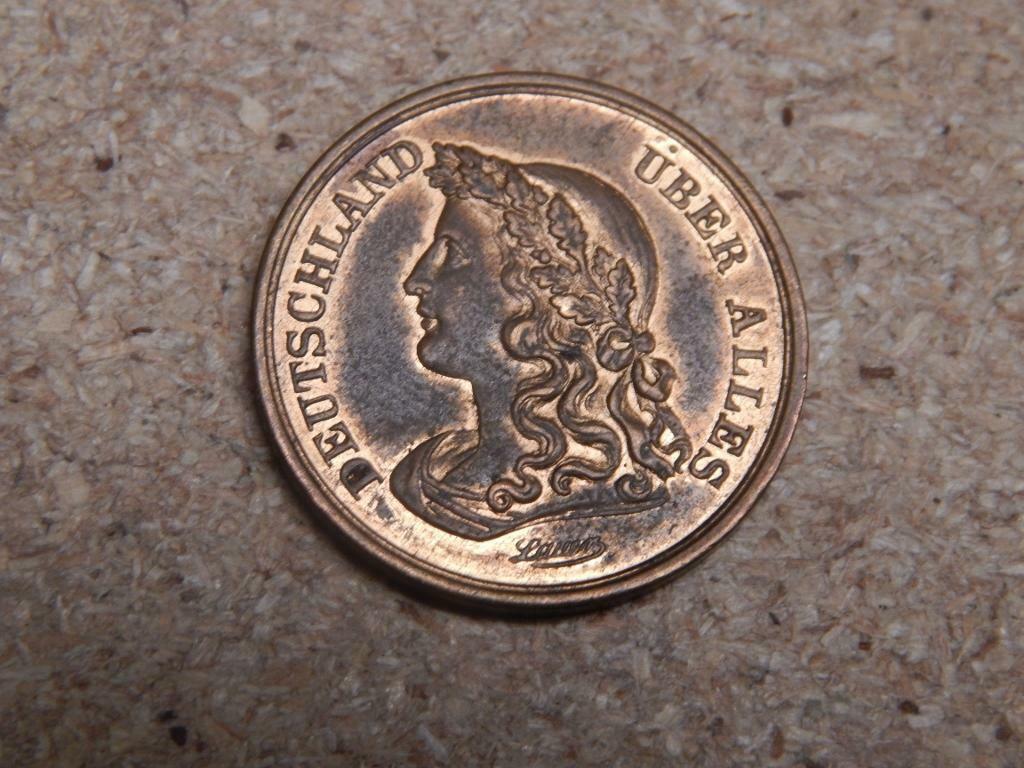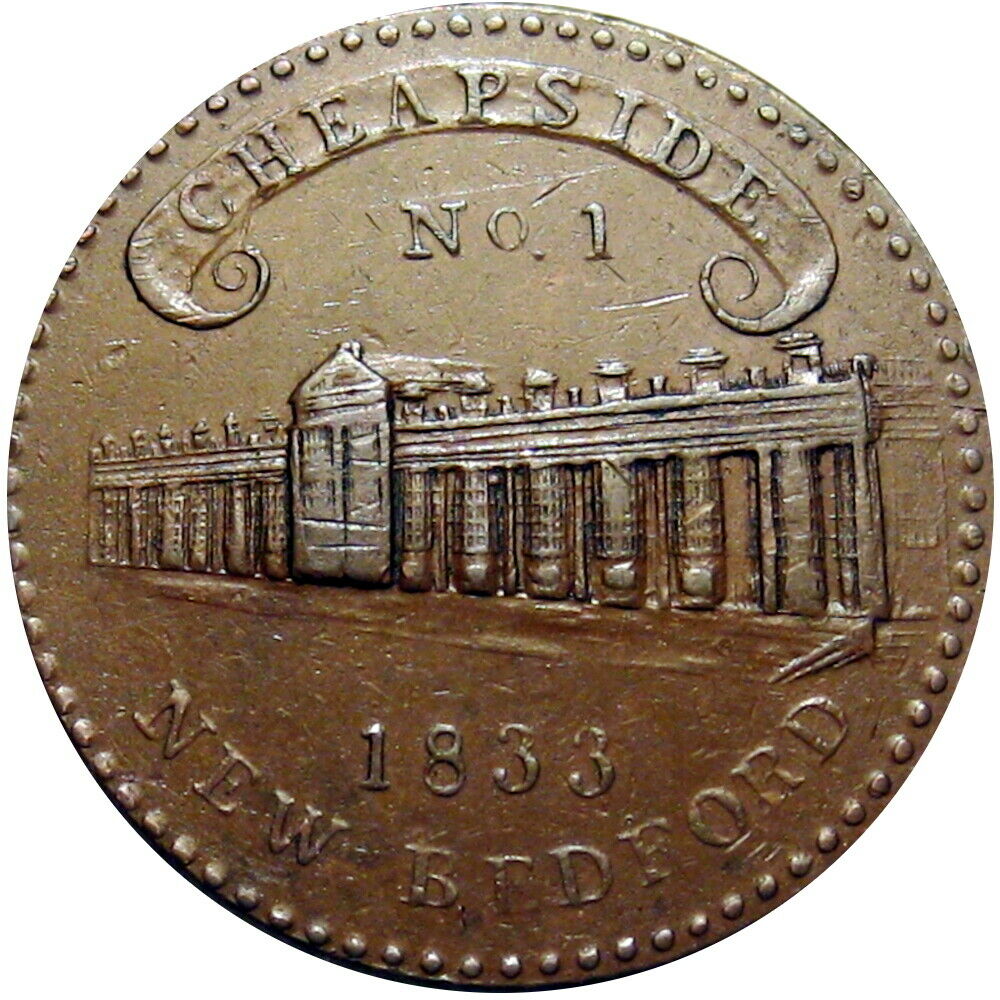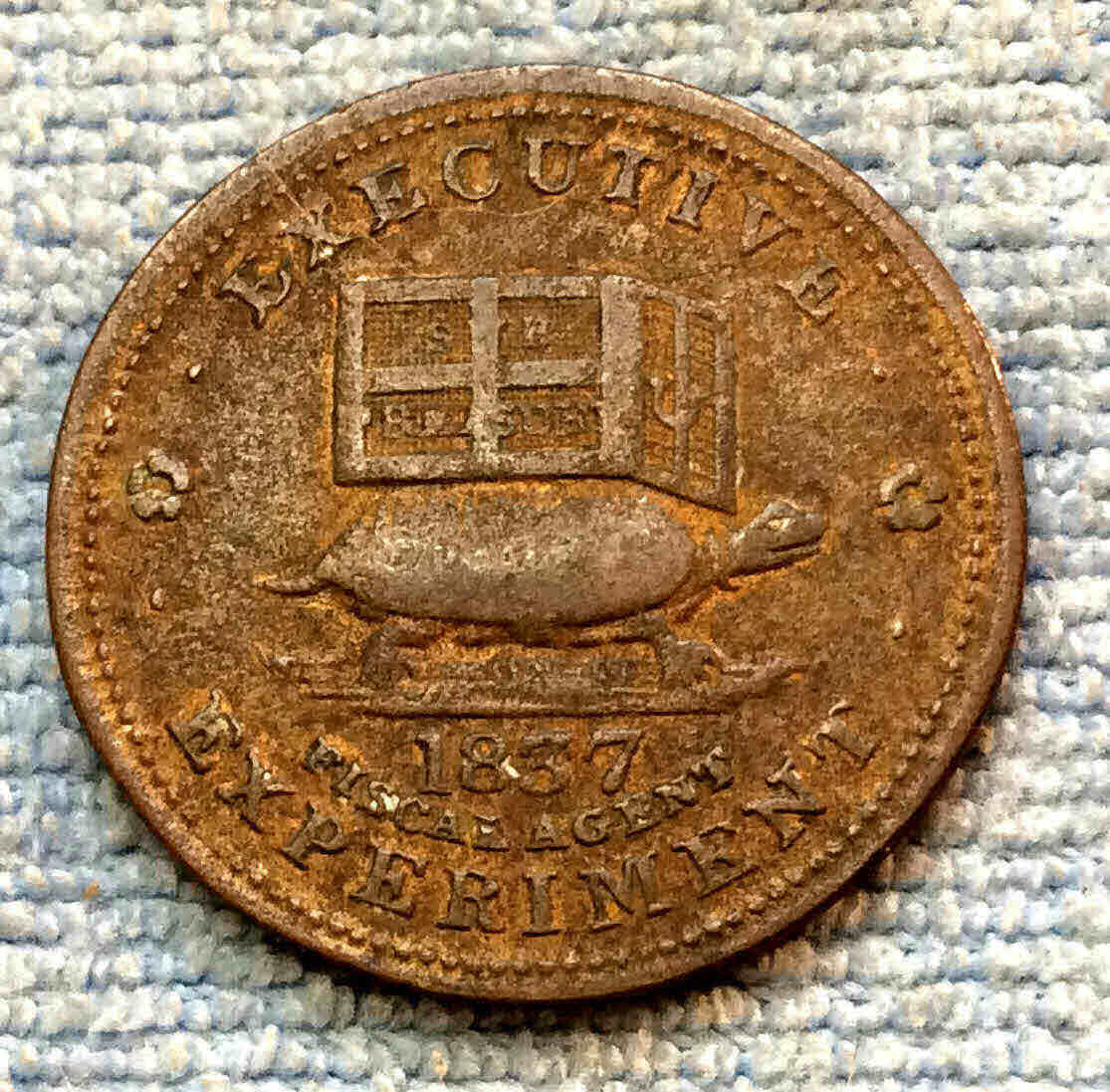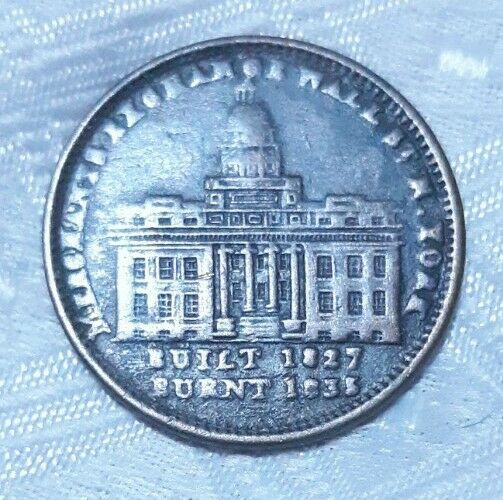-40%
OLD GERMAN JETON COIN UBER ALLES DEUTSCHLAND GOTT SENGE GOD BLESS NUREMBERG VTG
$ 104.54
- Description
- Size Guide
Description
OLD GERMAN JETON COIN UBER ALLES DEUTSCHLAND GOTT SENGE GOD BLESS NUREMBERG VTGGREETINGS, FEEL FREE
TO
"SHOP NAKED"
©
We deal in items we believe others will enjoy and want to purchase.
We are not experts.
We welcome any comments, questions, or concerns.
WE ARE TARGETING A GLOBAL MARKET PLACE.
Thanks in advance for your patronage.
Please Be sure to add WDG to your
favorites list
!
NOW FOR YOUR VIEWING PLEASURE…
DEUTSCHLAND ÜBER ALLES
GOTT SEGNE DEUTSCHLAND
Ernest Ludwig Sigmund Lauer 1783-1833
Johann Jakob Lauer 1806-1865
Ludwig Christian Lauer 1842-1873
L. Chr. Lauer GmbH
Sulzbacher Straße 47
D 90552 Röthenbach a.d. Pegnitz
Germany
LOOSLEY TRANSLATED
GERMANY OVER EVERYTHING
GOD BLESS GERMANY
Ernest Ludwig Sigmund Lauer 1783-1833
Johann Jakob Lauer 1806-1865
Ludwig Christian Lauer 1842-1873
L. Chr. Lauer GmbH
Sulzbacher Strasse 47
D 90552 Röthenbach a.d. Pegnitz
Germany
OLD GERMAN TOKEN
EXACT DATE IS UNDETERMINED
FABRICATED BY THE LAUER FIRM
OF
NURNBERG, GERMANY
LIKELY BY WOLFGANG LAUER
POSSIBLY FOR THE SANGERFEST
Deutschland Uber Alles - English Lyrics
Deutschland, Deutschland, before everything
Before every other land
When for freedom and for liberty
We together always stand
From the Meuse to the Memel
From the Adige to the Band
Deutschland, Deutschland, before everything
Before every other land
German women, German fealty
German wine, and German song
Will for generations coming
Be remembered far and long
And inspire us, to greater deeds
For our land, our legacy!
German women, German fealty
German wine, and German song
Justice, freedom, and our unity
For the German Fatherland!
Let us strive for these together
Brotherly with heart and hand
For our liberty, justice, and unity
Let our pledge, of fortune be!
Flourish in the grace of divinity
Flourish German Fatherland!
FACE DEPICTS A WOMENS PROFILE
FACING LEFT
WITH OAK LEAF WREATH IN HER HAIR
(MIT EICHENLAUB BEKRÄNZTER FRAUENKOPF IM PROFIL)
SIMILAR TO GERMAN ARTIST'S
MARTIN SCHONGAUER RENDITION OF
SAINT AGNES
THIS IS ALSO TRADITIONAL HEADWEAR
FOR THE SUMMER SOLSTICE
OR THE GODDESS LARES
JETON MEASURES ABOUT 22mm
BRASS COMPOSITION
ESTIMATED CIRCA
1860 - 1899
-----------------------
FYI
Nuremberg is a city in the German state of Bavaria, in the administrative region of Middle Franconia. Situated on the Pegnitz river and the Rhine–Main–Danube Canal, it is located about 170 kilometres (110 mi) north of Munich. It is the second-largest city in Bavaria (after Munich), and is the largest in Franconia. The population as of December 2011, is 510,602, which makes it Germany's fourteenth largest city. The "European Metropolitan Area Nuremberg" has 3.5 million inhabitants.
Nuremberg for many people is still associated with its traditional gingerbread (Lebkuchen) products, sausages, and handmade toys. Pocket watches — Nuremberg eggs — were made here in the 16th century by Peter Henlein. In the 19th century Nuremberg became the "industrial heart" of Bavaria with companies such as Siemens and MAN establishing a strong base in the city. Nuremberg is still an important industrial centre with a strong standing in the markets of Central and Eastern Europe. Items manufactured in the area include electrical equipment, mechanical and optical products, motor vehicles, writing and drawing paraphernalia, stationery products, and printed materials. The city is also strong in the fields of automation, energy, and medical technology. Siemens is still the largest industrial employer in the Nuremberg region but a good third of German market research agencies are also located in the city. The Nuremberg International Toy Fair is the largest of its kind in the world. The city also hosts several specialist hi-tech fairs every year, attracting experts from every corner of the globe.
Bandai Germany has its head office in Nuremberg.
Economy
Nuremberg for many people is still associated with its traditional gingerbread (Lebkuchen) products, sausages, and handmade toys. Pocket watches — Nuremberg eggs — were made here in the 16th century by Peter Henlein. In the 19th century Nuremberg became the "industrial heart" of Bavaria with companies such as Siemens and MAN establishing a strong base in the city. Nuremberg is still an important industrial centre with a strong standing in the markets of Central and Eastern Europe. Items manufactured in the area include electrical equipment, mechanical and optical products, motor vehicles, writing and drawing paraphernalia, stationery products, and printed materials. The city is also strong in the fields of automation, energy, and medical technology. Siemens is still the largest industrial employer in the Nuremberg region but a good third of German market research agencies are also located in the city. The Nuremberg International Toy Fair is the largest of its kind in the world. The city also hosts several specialist hi-tech fairs every year, attracting experts from every corner of the globe.
Culture
Nuremberg was an early centre of humanism, science, printing, and mechanical invention. The city contributed much to the science of astronomy. In 1471 Johannes Mueller of Königsberg (Bavaria), later called Regiomontanus, built an astronomical observatory in Nuremberg and published many important astronomical charts. In 1515, Albrecht Dürer, a native of Nuremberg, mapped the stars of the northern and southern hemispheres, producing the first printed star charts, which had been ordered by Johannes Stabius. Around 1515 Dürer also published the "Stabiussche Weltkarte", the first perspective drawing of the terrestrial globe. Perhaps most famously, the main part of Nicolaus Copernicus's work was published in Nuremberg in 1543.
Printers and publishers have a long history in Nuremberg. Many of these publishers worked with well-known artists of the day to produce books that could also be considered works of art. In 1470 Anton Koberger opened Europe's first print shop in Nuremberg. In 1493, he published the Nuremberg Chronicles, also known as the World Chronicles (Schedelsche Weltchronik), an illustrated history of the world from the creation to the present day. It was written in the local Franconian dialect by Hartmann Schedel and had illustrations by Michael Wohlgemuth, Wilhelm Pleydenwurff, and Albrecht Dürer. Others furthered geographical knowledge and travel by map making. Notable among these was navigator and geographer Martin Behaim, who made the first world globe.
Sculptors such as Veit Stoss, Adam Kraft and Peter Vischer are also associated with Nuremberg.
Composed of prosperous artisans, the guilds of the Meistersingers flourished here. Richard Wagner made their most famous member, Hans Sachs, the hero of his opera Die Meistersinger von Nürnberg. Baroque composer Johann Pachelbel was born here and was organist of St. Sebaldus Church.
The academy of fine arts situated in Nuremberg is the oldest art academy in central Europe and looks back to a tradition of 350 years of artistic education.
Nuremberg is also famous for its Christkindlesmarkt (Christmas market), which draws well over a million shoppers each year. The market is famous for its handmade ornaments and delicacies.
Main sights
A panoramic city view
Nuremberg, seen from the castle
Nuremberg Castle: the three castles that tower over the city including central burgraves' castle, with Free Reich's buildings to the east, the Imperial castle to the west.
Heilig-Geist-Spital. In the centre of the city, on the bank of the river Pegnitz, stands the Hospital of the Holy Spirit. Founded in 1332, this is one of the largest hospitals of the Middle Ages. Lepers were kept here at some distance from the other patients. It now houses elderly persons and a restaurant.
Hauptmarkt, which provides a picturesque setting and famous market for gingerbread. Nuremberg's star attraction is the Gothic Schöner Brunnen (Beautiful Fountain) which was erected around 1385 but subsequently replaced with a replica (the original fountain is kept in the Germanisches Nationalmuseum). The unchanged Renaissance bridge Fleischbrücke crosses the Pegnitz nearby.
The following churches are located inside the city walls: St Sebald's, St. Laurence's, Frauenkirche (Our Lady's Church), Saint Clare's, Saint Martha's, Saint James the Greater's, Saint Giles's, and Saint Elisabeth's.
Gothic St Lorenz-Kirche (St. Lorenz church, St. Laurence), one of the most important buildings in Nuremberg. The main body was built around 1270–1350.
The church of the former Katharinenkloster is preserved as a ruin, the charterhouse (Kartause) is integrated into the building of the Germanisches Nationalmuseum and the choir of the former Franziskanerkirche is part of a modern building.
The Germanisches Nationalmuseum is Germany's largest museum of cultural history, among its exhibits are works of famous painters such as Albrecht Dürer, Rembrandt, and Ernst Ludwig Kirchner.
The Neues Museum Nürnberg is a museum for modern and contemporary art.
The Walburga Chapel and the Romanesque Doppelkapelle (Chapel with two floors) are part of Nuremberg Castle.
The Johannisfriedhof is a medieval cemetery, containing many old graves (Albrecht Dürer, Willibald Pirckheimer, and others). The Rochusfriedhof or the Wöhrder Kirchhof are near the Old Town.
The Tiergarten Nürnberg is a zoo stretching over more than 60 hectares (148 acres) in the Nürnberger Reichswald forest.
There is also a medieval market just inside the city walls, selling handcrafted goods.
The German National Railways Museum (German) (an Anchor Point of ERIH, The European Route of Industrial Heritage) is located in Nuremberg.
The Nuremberg Ring (now welded within an iron fence of Schöner Brunnen) is said to bring good luck to those that spin it.
The Nazi party rally grounds with the documentation-center.
(THIS PICTURE FOR DISPLAY ONLY)
---------------------------
Thanks for choosing this auction. You may email for alternate payment arrangements. We combine shipping. Please pay promptly after the auction. The item will be shipped upon receipt of funds. WE ARE GOING GREEN, SO WE DO SOMETIMES USE CLEAN RECYCLED MATERIALS TO SHIP.
Please leave feedback when you have received the item and are satisfied. Please respond when you have received the item.
*****
5*'s
*****
If you were pleased with this transaction, please respond with all 5 stars! If you are not pleased, let us know via e-mail. Our goal is for 5-star service. We want you to be a satisfied, return customer.
Please express any concerns or questions. More pictures are available upon request. The winning bid will incur the cost of S/H INSURED FEDEX OR USPS. See rate calculator or email FOR ESTIMATE. International Bidders are Welcome but be mindful if your country is excluded from safe shipping.
Thanks for perusing
THIS
and
ALL
our auctions.
Please Check out our
other items
!
WE like the curious and odd.
BUY, BYE!!
I
Track Page Views With
Auctiva's FREE Counter













